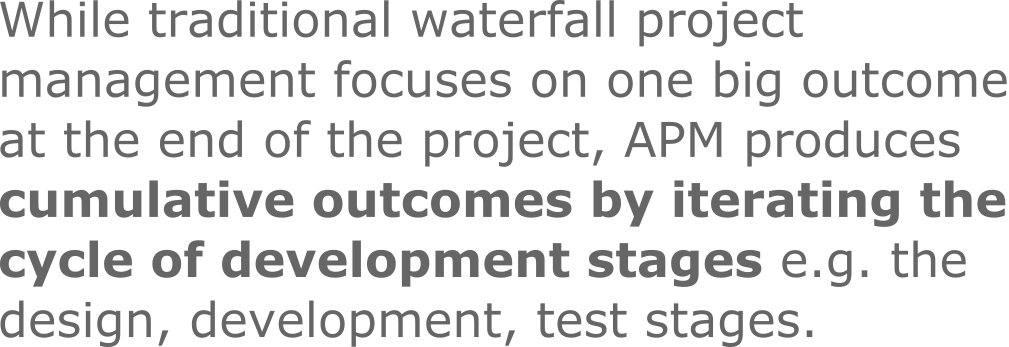CS220AU
project management
Agile Project Management (APM)

Consider managing your assignment with APM.
Here is an outline of its five stages:
1. goals stage
- identify a problem and potential solutions
- use initial literature review and discussions to define the problem and the potential solutions
- in academic terms, this stage is linked to writing the research question (the problem) and the objectives (the objectives are ways/methods that you think can answer the research question, provide solutions)
- this stage is based on your own idea/problem and your research on how others have thought about the idea/problem before you e.g. by using or developing a specific tool/method(ology)
What are your goals in the CS220 assignment i.e. what problems are you trying to solve with (1) your di-reflection and (2) your website?

2. design stage
- further development of objectives (the potential solutions) with a (somewhat) detailed breakdown on how you will use or develop tools to answer your research question
- useful tools:
- a thorough TODO list
- a timeline with deadlines using a Guntt chart e.g. https://bcmi.khofstadter.com/start-of-the-research/
- useful tools:
What tools can you use to design the narrative of your di-identity essay?
What tools can you use to design the layout of your website?

3. development stage
- depending on the project, this stage can have more literature review e.g. gathering data to compare/analyse/critic/repurpose/re-contextualise, etc.
- the stage, where the actual ‘work’, the ‘art’ is growing e.g. by
- writing text e.g. books, journal articles, blog posts
- producing audio e.g. a podcast series, sound design and music, interviews, etc.
- producing video e.g. a vlog with screencasts, short film documentaries, art films, music videos
Can we readdress previous stages, the goals and the design stages?
How important is it to have clear goals and a detailed design?

4. test stage
- seeking feedback from other people e.g. clients, potential clients, your minimum viable audience, your colleagues, professionals e.g. with
- quantitative and qualitative surveys
How is this test stage implemented in your assignment?

5. deployment stage
- here we publish i.e. distribute, disseminate, share and advertise our work
- important to contextualise for different channels (synchronise your work with your target audience’s thinking e.g. by using context specific vocabulary)
- your portfolio website can have the full project or a brief outline with an external hyperlink e.g. as seen on https://khofstadter.com/
project management tools
My preferred tool is the following combo:
GitHub, Markdown and Visual Studio Code (VSC)
The github-and-markdown.md file outlines this tool.
If you want to use the Zettlekasten method to organise your notes, you can use a VSC extension called Foam for free with GitHub, Markdown and VSC.
alternatives
- Trello
- Workflowly
- Roam Research - Zettlekasten method
- Obsidian - Zettlekasten method
- Evernote
- Notion
- physical notebook + 4 colour BIC pen
note taking ideas
listening to podcasts
- when listening to a podcast, you can walk or lay down and keep you eyes shut, perhaps do the washing up or something very manual/repetetive
- to take notes, you could pause your podcast player and instead of taking notes in writing (on an app or in a physical notebook) - you could use an audio recorded app
- this could help you summerise what you’ve learnt in your own words, which note can later. This can help you in your essay when you need to paraphrase something.
- why notetaking? https://link.springer.com/article/10.1007/BF00136532
timekeeping ideas
- set some time aside for your work and only concentrate on your work e.g. switch of notifications on your devices, don’t check Facebook Messages or emails, don’t listen to distracting music, etc.
- track your time e.g. work for 1 hour and make sure you understand that your brain needs to warm up (to create some kind of momentum) and also leave time for putting things in your log and your TODO list
- there different email clients
- and different email formats (e.g. HTML vs text)
- attach file or link file (same for forums) to email (e.g. link with WeTransfer/Dropbox/Google Drive or images with https://imgur.com/)
- spam filters and how to not get caught in them (https://www.mail-tester.com/) and common practice (e.g. ask people to whitelist your email address, etc.)
mailing list
- what info can I keep about others?
- check MailChimp
resources
#multi-tasking
- Bavelier, D (2012) Your brain on video games. TED talk. A neuroscientist talks about the benefits of video gaming on your eyesight and multitasking. She also distinguishes between multitasking and multimedia-tasking. Video available on YouTube. Find her papers on Scholar.
#book-summary
- Waitzman (2022) Best Blinkist alternatives in 2022. Although the Blinkist app is easy to use and provides you with access to plenty of features, there are also a few downsides to Blinkist. Here’s what you should consider when seeking book summaries. Article available on Speechify.
